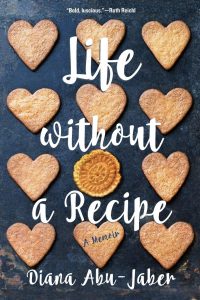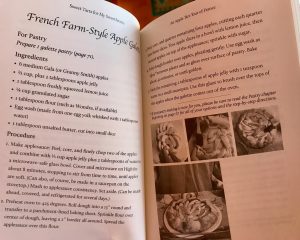Last week, taking a break from Fire & Blood, the brilliant but oh-so-bloody history of Mexico by T. R. Fehrenbach that I’ve been reading in short but steady spurts every night now for weeks, I reread a delightful memoir in my eBook library, Life Without a Recipe, by Diana Abu-Jaber. Sometimes it’s necessary, I’m finding, to step away from the overwhelming, historical truths of man’s inhumanity to man (so much war, so much cruelty) and read about one, other, contemporary woman’s life, especially when that woman writes so well and from the heart.
Ruth Reichl, American food writer and former editor in chief of Gourmet, called Diana Abu-Jaber’s newest memoir, Life Without a Recipe,“bold” and “luscious” – “indispensable to anyone trying to forge their own truer path.” Or as I would put it: anyone seeking their own, personalized life recipe.
I’d come to know award-winning author Diana Abu-Jaber through her first memoir, The Language of Baklava(2005), when I included it in a graduate school research paper I was doing on memoirs-with-recipes. That charming book, filled with love and laugh-out-loud passages, told of her early years growing up in New York State with her larger-than-life Jordanian father, Bud, and his passion for food and cooking.
In this memoir, Life Without a Recipe, in sparkling prose, Diana takes her readers further, focusing on the two greatest influences in her life – her tough, Catholic, German maternal grandmother, Grace, and her flamboyant Muslim father, Bud – and how she as a young woman was caught between their contradictions. She refers to this in food terms (of course) as “the ancient war between dinner and dessert.”
Her grandmother Grace, she writes, “was the fountainhead, the wellspring of sweetness in the world. She’d lived through the Great Depression, raised a daughter on her own, worked without respite for years. She knew the importance of a little sugar in life.” [So] “she brought forth armloads of candy” for her three granddaughters.
Diana’s father, Bud, on the other hand, “was suspicious of sugar and loved to claim he never ate ‘white food.’ The pleasure of the palate, for him was all salty, bready, meaty, cucumbers and yogurt and olives.”
Ultimately, Diana ignores their well intentioned “recipes” for the way she should live her life and she comes up with her own. As she discovers, however, finding one’s own path sometimes takes a mistaken marriage or two (or three). And it takes a great deal of angst (was it possible to have a serious writing career AND be a mother?) and, even when she knew what she wanted (of all things, in one’s mid-forties — a baby!), the nerve to pursue it.
Finally, and happily, Diana and her third husband Scott adopt a beautiful brown baby girl, name her Grace, and shower her with all the bottomless love and joy they have.
Despite the real tears I shed when I read of “our” beloved Bud’s death at the age of seventy-five (oh, to have had a father like him!), this is an uplifting and heart-warming memoir, which for me held deeper meanings and made me ask some crucial questions, the main one being: Whose recipe are we to follow in our lives?
When I was young, that recipe’s step-by-step procedure as laid out for young people went something like this: grammar school … high school … college … marriage … child rearing … home ownership … career … retirement … death. Anyone who deviated from this prescribed path was considered a social pariah.
Attitudes have since changed, of course, many for the better. But still it takes courage, I believe, to analyze one’s own unique ingredients and come up with our own individual recipe for a full and rich life – the life we were meant to live.
~ ~ ~ ~ ~
On a practical note: The other day I baked an apple galette for my friend Nancy who was coming here for tea. This French farm-style apple tart emerged from the oven a pretty little thing:
But I realized (too late) that I’d been too heavy-handed with the fresh lemon juice and too stingy with the sugar when I tossed the apple slices in. This tart wasn’t sweet enough! A sweet tart must be sweet– it’s a dessert, after all.
So my note to self: Don’t be in a rush, and don’t cut corners. Above all, pay closer attention to your own recipe.
Here is that recipe, from pages 12-13 of my new book, Sweet Tarts for My Sweethearts:
~ ~ ~ ~
And on another note: I recently recorded an essay I’d written for the wonderful website Eat, Darling, Eat, titled “Cooking Under Pressure.” It’s only five minutes long. You can listen to it here: https://www.eatdarlingeat.net/2017 .




Hi Bonnie, I love the metaphor — every aspect of life, food for example, provides insights into the decisions we make and the way we look at our lives. The “ancient war between dinner and dessert” is wonderful! I am staying with treasured friends in Sedona. They keep apologizing because my cottage is partly perfect and partly a construction zone. This is how I think of my life! Don’t worry though that your tart wasn’t sweet enough. You are certainly so maybe it’s a metaphor for this bittersweet time in history.
Thank you, Kim dear! So you’re back in CA now?! Yes, “bittersweet” is right. But we’ll get through it, bite by bite. — xx
Lovely essay, Bonnie. Sometimes I think the recipe for our lives should include a “go back three steps and correct the errors you made the first time”. Sadly, not possible. But it IS possible to turn the page and find a new recipe! Wonderful episode of “Cooking Under Pressure”… your language and your reading of it were vivid and colorful…I could “see” you there, skinny little thing, managing the household.
Thank you so much, P. — for reading all the way to the end AND listening to the recording! What a pal you are. I hope all is well with you and you are enjoying your new place in Mexico’s south. Happy, Health Holidays and a Merry 2021!
Wonderful advice.
Thank you, dear Lyn!
And sometimes the recipe finds you! Or you may have one recipe and life hands you another. Or you open a cook book and there’s a recipe you never even thought of; so you decide to try it.
Thanks, Bonnie. Food for thought. I’m sure everyone loved your tart, anyway. And there’s another one: we have the recipe, but some times what we make turns out to be too sour or too sweet.
All true, dear Helaine! Thanks for your insightful response! — Merry & Happy, BB
Dear Bon,
What a lovely post about someone I was unfamiliar with. Diana Abu Jabar seems like she was quite a woman.
I tried to watch your video last week but was unable to get it to play. I will try later this week, once I’m off from work.
I’m skipping Christmas this year, or I am celebrating it in a personal way only. I’m staying home, which is fine with me.
Sending you lots of love from freezing-cold Boston where we had over a foot of snow.
Paul
Dearest Paul — I suspect a whole lot of us are skipping Christmas this year, so you won’t be alone. (My favorite Christmas seasons were those spent in Mali, a Muslim country, where Christmas isn’t recognized at all!) Just curl up with a good book and some nice hot, milky coffee (or cocoa). Luxuriate! — LU, BB xx
After reading the Language of Baklava, at your suggestion, I of course bought Life Without a Recipe! I think both books are great!
Wonderful, Lucy! Yes, Diana really knows how to write about food-as-metaphor, doesn’t she!
Que awesome, la Bonnie! I will look for her book. Interesting…the secrets of using a pressure cooker. I am one of the scaredy cats who fear the pressure cooker…even today Porcupine meatballs! I love the sound of your voice, so clear and easy to understand. I am planning to use this recording in my ESL class. Is there a place where we can find the text?
Gracias!
Querida Te — I’m so happy you like the recording so much that you plan to use it in your ESL class! Yes, indeed, you can find the essay that I wrote and read from at http://www.eatdarlingeat.net — just type in Cooking Under Pressure in the Enter Search box, and it will come up, complete with photo of me at 5 y.o. with my mom and siblings AND the recipe for Porcupine Meatballs! Gracias a ti, BB xx
Dearest BB, Lovely essay, as always. Your response to Paul Matteo (Hi Paul!) about how to celebrate non-Christmas reminded me on one of my best Christmases ever, which is the one I spent with you in Segou. Aside from getting arrested in the morning for my taking pictures of the governor’s mansion and almost spending Christmas day in jail, it was perfect. Since then, I always tell people that if you want to sidestep consumerist American Christmas, go spend it in a poor Muslim country.
Monty
Now THAT was an exciting non-Christmas Christmas, wasn’t it, Monty dear?! What fun we had — and priceless memories. — BB xx
Lovely recording, Bonnie. I had no idea you had all that responsibility at such a young age. That must have been petrifying.
I’m so glad you liked the recording, Barbara. I hope you and family are doing well. Happy and healthy holidays!
Ruth Reichl’s books are my favorite!!!
This one isn’t by Ruth Reichl, as you know, Jamie; she just wrote the cover blurb for it.